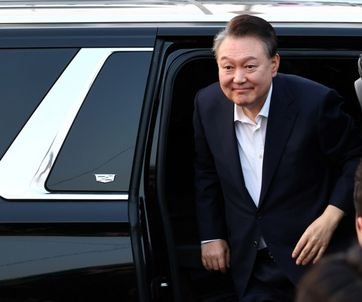South Korea’s impeached president Yoon Suk Yeol gets out of the Presidential Security Service vehicle as he arrives in front his official residence after being released from detention, in Seoul, South Korea, in March. EPA-EFE/Yonhap South Korea
May 4 (UPI) — While the divided and dysfunctional South Korean political system is preparing for the June 3 election of a new president after the impeachment of President Seok-yeol Yoon, Korean citizen activists are looking beyond that event.
They are promoting a new politics with a broader sense of national purpose that rises above current party politics. This was the message Inteck Seo, co-chair of Action for Korea United (AKU) in South Korea brought to a gathering of representatives of Korean-American organizations in the DC Metro area at the Capitol Visitors’ Center on Saturday.
AKU is the largest coalition of civil society groups in South Korea promoting reunification. The event was held to mark the 80thyear of Korea’s liberation from Japanese colonial rule.
Seo argued that the three pillars on which the North Korean regime had stood – management of the entire economy, ideological control, and the politics of fear – were all crumbling. “The regime is on the brink of collapse,” he said, “and we have to prepare for that future.”
“North Korea recognizes that it can no longer compete with the South,” he said. As a result it abandoned the long-standing goal of Korean reunification led by the North earlier this year.
Seo cited the U.S. Declaration of Independence which laid out the foundational principle that “all men are created equal and endowed by the Creator” with fundamental rights and freedoms, before listing the particular complaints against the British Crown. The movement for Korean reunification, likewise, needed to begin with a vision and principles that Koreans in the South could unite around before considering methods and processes.
The roots of that vision that he called the Korean Dream were to be found in Korea’s ancient, pre-division culture, he suggested. In particular the principle of Hongikingan, living to “broadly benefit all mankind “connected Koreans with their past and with the ideals of the Korean Independence movement of the early 20th century.
He proposed that a new, unified Korea should be a model liberal democracy with a system of checks and balances; a moral free market economy; a free press; an educational system that cultivated ethical character and a spirit of public service; and freedom of religion and conscience.
The examples of Mahatma Gandhi and Martin Luther King showed the power of citizens’ movements to spark major cultural and political change. Seo noted that German unification was not a top-down process but was initiated from the bottom-up. Change in Korea would be launched in the same way. He urged Korean-American civil society groups to support the work of AKU in advancing reunification.
Fellow keynote speaker Morse Tan, former U.S. Ambassador for Global Criminal Justice, noted that in that role he had dealt with terrible atrocities in many countries but North Korea was by far the worst. It had a history of “sadness, oppression, and injustice.”
“Many of North Korea’s problems could be solved through reunification,” he added, mentioning human rights and freedoms, and military and nuclear issues.
Dr. Suzanne Scholte, President of the North Korean Freedom Foundation, urged a human rights upfront policy towards North Korea by the U.S. government. Her organization engages with people in North Koreat through information broadcast by Free North Korean Radio, staffed by North Korean escapees. It also smuggles in flash drives, SD cards, and radios.
David Maxwell, former U.S. Special Forces Colonel who served in Korea, and regular UPI contributor, noted that 30 years of U.S. diplomacy focused on North Korean denuclearization had totally failed in its goal. He proposed the motto “unification first, the denuclearization.” Unification policy should be pursued through a focus on human rights and a campaign to flow information into North Korea.
The event was organized by Alliance for Korea United-USA and the Congressional host was Rep. Young Kim, CA. Seo now travels to the West coast where he will meet with leaders of Korea organizations in the Seattle area.

